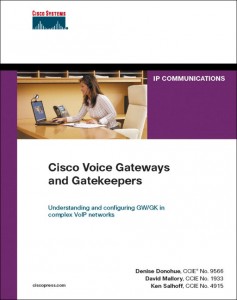
Cisco Voice Gateways and Gatekeepers
By Denise Donohue, David Mallory, Ken Salhoff
………………………………………..
Publisher: Cisco Press
Pub Date: August 17, 2006
Print ISBN-10: 1-58705-258-X
Print ISBN-13: 978-1-58705-258-3
Pages: 648
Cisco Voice Gateways and Gatekeepers
Understanding and configuring GW/GK in complex VoIP networks
Denise Donohue, CCIE® No. 9566
David Mallory, CCIE No. 1933
Ken Salhoff, CCIE No. 4915
Deployments of voice over IP (VoIP) networks continue at a rapid pace. Voice gateways are an essential part of VoIP networks, handling the many tasks involved in translating between transmission formats and protocols and acting as the interface between an IP telephony network and the PSTN or PBX. Gatekeepers and IP-to-IP gateways help these networks scale. Gatekeepers provide call admission control, call routing, address resolution, and bandwidth management between H.323 endpoints including Cisco IOS® voice gateways and Cisco® Unified CallManager clusters. IP-to-IP gateways allow VoIP calls to traverse disparate IP networks.
Cisco Voice Gateways and Gatekeepers provides detailed solutions to real-world problems encountered when implementing a VoIP network. This practical guide helps you understand Cisco gateways and gatekeepers and configure them properly. Gateway selection, design issues, feature configuration, and security and high-availability issues are all covered in depth. The abundant examples, screen shots, configuration snips, and case studies make this a truly practical and useful guide for anyone interested in the proper implementation of gateways and gatekeepers in a VoIP network. Emphasis is placed on the accepted best practices and common issues encountered in real-world deployments.
Cisco Voice Gateways and Gatekeepers is divided into four parts. Part I provides an overview of an IP voice network. Part II is dedicated to voice gateways, including discussions of Media Gateway Control Protocol (MGCP); H.323; Session Initiation Protocol (SIP); voice circuit options; connecting to the PSTN, PBX, and IP WAN; dial plans; digit manipulation; route selection; class of restriction; Survivable Remote Site Telephony (SRST) and MGCP fallback; digital signal processor (DSP) resources; and Tool Command Languaue (Tcl) scripts and Voice XML (VXML). Part III addresses voice gatekeepers, including detailed deployment and configuration. Part IV is dedicated to IP-to-IP gateways.
“With this book, the authors provide an in-depth look at the breadth of voice gateway features and capabilities, as well as providing voice gateway configuration guidance.”
Christina Hattingh, Access Technology Group, Cisco Systems®
Denise Donohue, CCIE® No. 9566, is a design engineer with AT&T. She is responsible for designing and implementing data and VoIP networks for SBC and AT&T customers.
David L. Mallory, CCIE No. 1933, is a technical education consultant with Cisco Systems, supporting Cisco voice certifications. Prior to this role, David was a systems engineer supporting several global enterprise customers.
Ken Salhoff, CCIE No. 4915, is a systems engineer with Cisco Systems. Ken has been specializing in voice technologies at Cisco for the past six years.
Understand the pros and cons of MGCP, H.323, and SIP, how they implement call signaling and describe call flow, and how to configure each protocol
Learn the various analog and digital voice circuit options used to connect a VoIP network to the PSTN
Configure and troubleshoot PSTN, PBX, and IP WAN connections
Build scalable dial plans and understand the different types of dial peers
Understand the various ways gateways control called and calling phone numbers
Examine call admission control (CAC) techniques
Configure Class of Restrictions (CoR) for both inbound and outbound calls
Deploy and troubleshoot SRST and MGCP fallback
Evaluate DSP considerations and resources
Support interactive voice response (IVR) and advanced call-handing applications using Tcl scripts and VXML
Deploy and configure basic and advanced gatekeeper functions
Configure and troubleshoot IP-to-IP gateways
This IP communications book is part of the Cisco Press® Networking Technology Series. IP communications titles from Cisco Press help networking professionals understand voice and IP telephony technologies, plan and design converged networks, and implement network solutions for increased productivity.
Category: Cisco PressIP Communications
Covers: VoIP gateways and gatekeepers